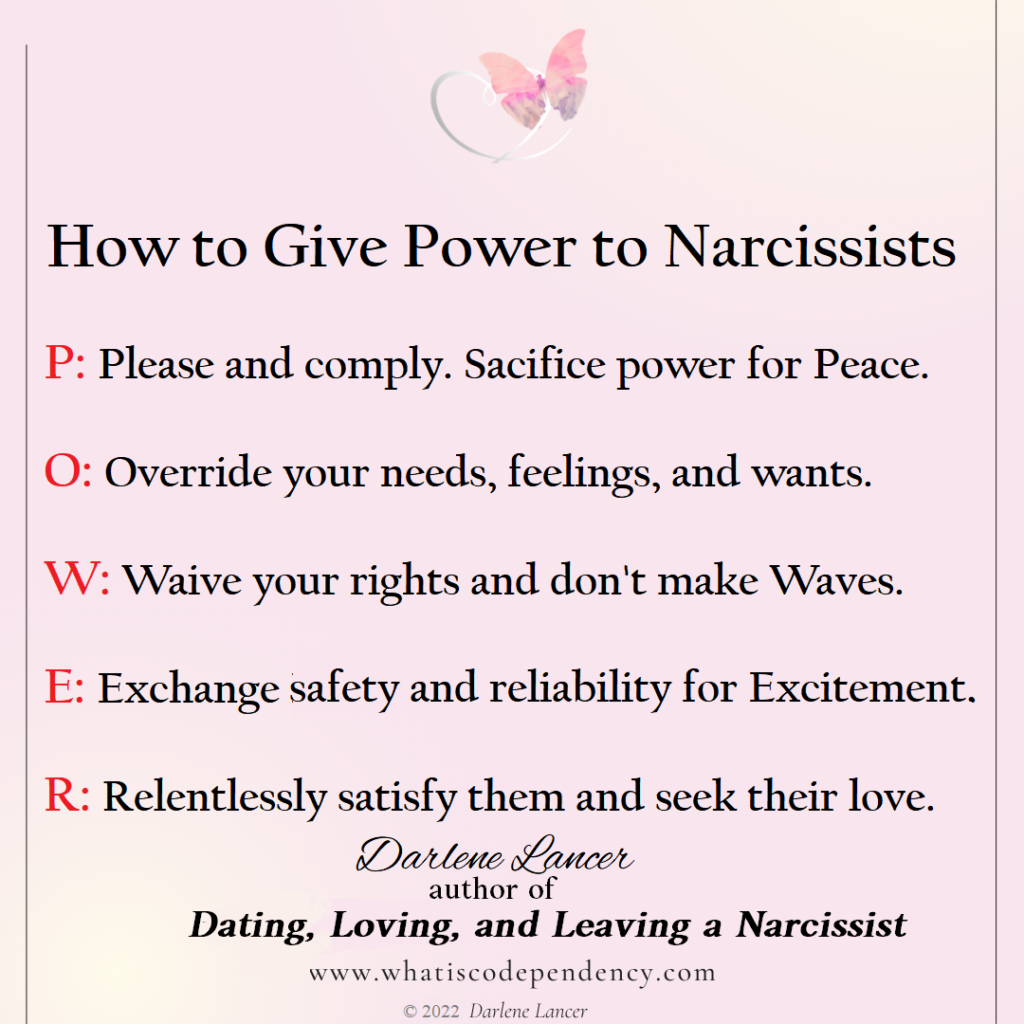The core problem in narcissistic relationships is that they prioritize power and sacrifice the relationship to get it, while their partners prioritize the relationship and sacrifice themselves to keep it.
problem in narcissistic relationships is that they prioritize power and sacrifice the relationship to get it, while their partners prioritize the relationship and sacrifice themselves to keep it.
Narcissists put themselves first, and so do their partners. Due to their insecurities, they constantly scan their environments and monitor their interactions to see who’s on top, and they use impression management, manipulation, and abuse to ensure they are.
In order to improve a relationship with a narcissist, people must stand their ground and equalize the power dynamics.
Pleasing
Narcissists sacrifice peace for power, and most people sacrifice their power for peace. Whereas narcissists want to get ahead, other people want to get along. They want to avoid conflict, narcissistic rage, or abandonment. But continuing to accommodate and give in fuels a narcissist’s tantrums and demands, like indulging a spoiled toddler. Pleasers and accommodators believe that if they give narcissists what they want, eventually they, too, will get their needs met. But narcissists are selfish and think only about what is good for them and how to get it. Once you understand the equation, you can better get what you need and want.
Overriding
In narcissistic relationships, partners go along to get along. They sacrifice themselves, and override their needs, wants, opinions, and feelings to have a better relationship. They end up harboring resentment and find that their sacrifice is for naught. Narcissists expect and feel nothing is owned in return…unless they have to pay a price! Meanwhile, those around the narcissist feel worse about themselves. Their self-esteem, confidence, and self-worth suffer, which can lead to anxiety, depression, and despair.
Waiving Your Rights
Typically, people don’t set boundaries with narcissists. They rather waive their rights than make waves. They’re afraid to do so or they try and complain it didn’t work. First, you must believe you have rights, and narcissists will shame and blame you and try to convince you otherwise. It takes courage to set boundaries with a narcissist and usually requires outside support. There must also be consequences to get their attention. See “10 Reasons Why Boundaries Don’t Work.”
Excitement over Safety
Consistency and reliability are essential to a secure relationship. In abusive and narcissistic relationships, partners confuse excitement and anxiety. It’s a serious issue for people growing up with controlling, inconsistent, or abusive parenting because they’re not accustomed to feeling safe and secure. Often, they’re used to drama and consider it normal. Walking on eggshells and not feeling safe to speak up, share their feelings, and ask for their needs feels normal, but it’s a symptom of insecurity. This can happen when there is a lot of marital conflict, addiction, mental illness, or other stressors in the home. Living with Jekyll and Hyde is unpredictable and can be terrifying and traumatic. It’s not exciting.
Relentless Efforting
In narcissistic relationships, codependents keep trying to please them and meet their needs, but narcissists are emotionally unavailable empty vessels. Their need for narcissistic supplies is bottomless and exhausting to those around them. Trying to give them admiration and whatever they need enables their sense of entitlement and makes you subordinate to them, like a servant. Partners get hooked on crumbs, hoping for signs of attention, caring, or affection. Periodic reinforcements become rarer over time, but partners get addicted to the chance they’ll return.
However, there is hope. It requires a reversal of what loved ones do in narcissistic relationships. Then the relationship will in most cases change for the better, but more importantly, they will be transformed and empowered. They will be able to assess the relationship and decide whether to stay or will have gained the courage to leave and not repeat the same codependent behavior. Specific strategies required for dealing with a narcissist are described in my book, Dating, Loving, and Leaving a Narcissist: Essential Tools for Improving or Leaving Narcissistic and Abusive Relationships in bookstores and at www.whatiscodependency.com.
© 2022 Darlene Lancer

Desarrollo de la autoaceptación
La autoaceptación es un nivel más profundo de autoestima. (Lea “¿En qué se diferencian el amor propio, la autoestima y la autoaceptación?”) La meditación y nos ayudan a practicar la presencia y la autoaceptación. Existe de que los altos niveles de atención plena se correlacionan con niveles más altos de autoestima y una autoestima más segura. En un estado meditativo, podemos notar e ignorar y ansiedades. Podemos practicar la presencia en ese estado atemporal y aprender que momento a momento podemos aceptar todo tal como es, incluyéndonos a nosotros mismos. Esto es liberador para nosotros y para cualquier persona que encontremos.
Sin embargo, no es fácil funcionar siempre a ese nivel. Sin años de práctica y sanación de nuestro pasado, pronto volvemos a nuestras formas habituales de s
I found this article very informative and I could apply it personally. I will have a weekend of reading as I explore the links! I have read about narcissism, but bring it into focus from the codependency aspect which does bring some hope.
I’m glad you find it helpful. See my book available in April, Dating, Loving, and Leaving a Narcissist: Essential Tools for Staying or Leaving Narcissistic and Abusive Relationships. to learn how to change the power dynamics in abusive relationships. I also recommend counseling and CoDA.org meetings.